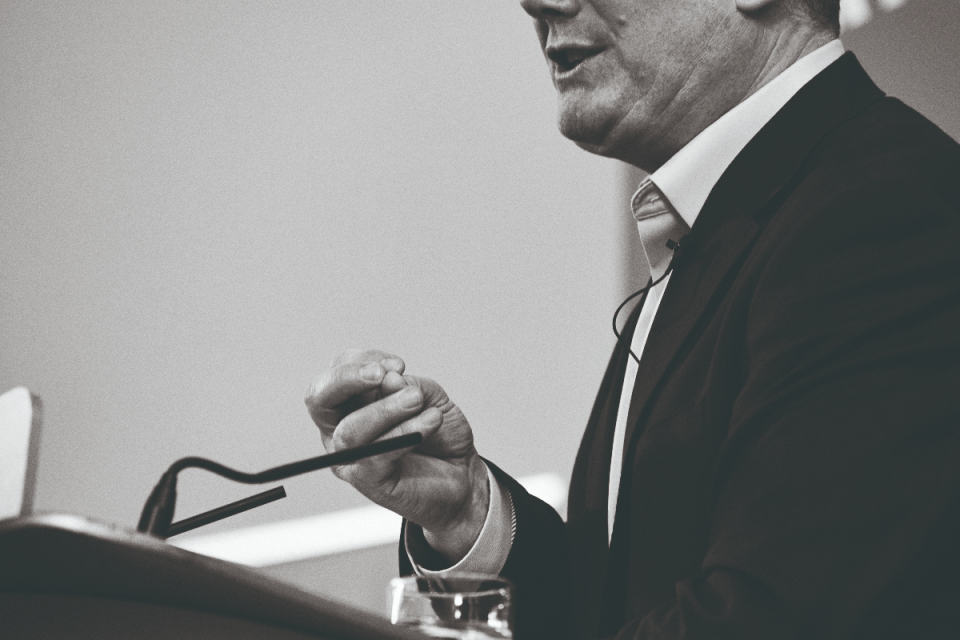Keir Starmer could be doing anything. Why does he want to be Prime Minister?

Keir Starmer is the cover interview from The City A.M. Magazine Spring edition. The heir apparent to the biggest job in the country, Andy Silvester chats to him about packing in the law, Tory attacks and his hopes for a Labour government.
Photographs by Josh Shinner
It is a grey, unspectacular Monday morning and in a stuffy basement hall, one of the country’s most accomplished lawyers is patiently posing, his grin slightly forced, for selfies with people he has never met and is unlikely to meet again.
One wonders at stage-managed events like this one – from which you can hear the thundering roar of the Westway – why anyone would put themselves through the sheer faff of politics. This is particularly relevant for Keir Starmer, who packed in a glittering legal career to be here, and whose earning power, prior to his shift into politics, would have been edging towards seven figures.
In another life, he could be in a black cab on the aforementioned Westway en route to Heathrow, using the names of seasons as verbs. Instead he’s standing on a cramped stage while ‘Vote Sadiq’ placards are passed over, around, and at one point perilously close to his head. He’s here to help launch the London mayor’s re-election campaign, with the click-click-“over here Keir”-click of photographers soundtracking the whole affair. Does the former director of public prosecutions, who turned to politics only in the run-up to the 2015 election, wonder how he ended up here?
When I was growing up, I didn’t think
Keir Starmer
people like me would become MPs, let alone leader of the Labour party or Prime Minister
“That’s an interesting question,” he guffaws. “People ask me if I always wanted to be Prime Minister, to which the answer is ‘no’. Because when I was growing up, I didn’t think people like me would become MPs, let alone leader of the Labour party.”
It seems a classic Starmer answer: cautious, humble, uncontroversial. This has not always gone down well, despite the position he finds himself in. Even some in his own party are frustrated that a 20-point poll lead isn’t even bigger. An entire industry of commentators line up to suggest ways in which he’s not up to the job. It’s a world away from the almost universal acclaim he received in his previous roles.
Does the man almost certain to be Britain’s next Prime Minister enjoy his job? “I much prefer being out of parliament,” he says in that measured tone, always engaging but falling a little short of inspiring. “In parliament you’ve got the tribal theatrics, of which PMQs is probably the worst example. I came into politics late and therefore I’m not as tribal as others.” A lot of MPs – admittedly more Tories, presumably those who have read the polls – are bailing out of Westminster for other jobs. Is all it worth it? Not just the tribal pantomime, but the intrusion that comes with the job, the constant scrutiny, the never-ending criticism. “Absolutely” he says.

His path to politics makes a little more sense when he charts how he got here. “Almost immediately [on becoming a lawyer] I started work on housing cases and employment cases and I got frustrated that, case-by-case, I wasn’t going to make much of a difference. That’s when I started doing group litigation to bring about bigger change.” That led him down the route of litigating to end the death penalty overseas. In a sort- of authorised, sort-of unauthorised book by his longtime friend Tom Baldwin, Starmer tells the story of being stood in a jail in Uganda with death row inmates, many of whom were as guilty of truly horrible crimes as the day is long. Rather than try to get individuals off here and there, Starmer and pals challenged the death penalty in British courts, which, thanks to some typically British colonial overhang, still had authority overseas. Starmer won. No more death penalty, a punishment that he says “horrifies him”, being “a process involving dozens of people methodically planning to exterminate another human being”.
“Then I went to Northern Ireland to work with the police, which for me was transformative because, as a lawyer, I’d been banging on the door from the outside wanting to bring about change and suddenly I found myself working with the police as part of the Good Friday Agreement.” That in turn led to his appointment under Gordon Brown as the director of public prosecutions, during which he led an organisation of 7,000-odd people and managed a substantial budget. He left with congratulations from the (Tory) attorney general and a thank-you dinner from then-home secretary Theresa May.
For my generation it wasn’t really in doubt that you get a pretty secure job, you get your foot on the housing ladder. Too many young people are ending up back at mum and dad’s, not having the job that they hoped for, and in a very uncertain world, that does worry me: the basic foundations of security are hugely important
Keir Starmer
Most impartial observers agreed that, aside from an over-zealous approach to hounding journalists (Rebekah Brooks is said to have called Starmer “the man who tried to put me in jail” over his decision to prosecute her over phone hacking), he didn’t do a bad job. The “political bit at the end” is how Starmer refers to what comes next. “After a five year term my wife was suggesting good, secure jobs in the law where I could continue to make some change with, you know, a decent salary,” he says, knowing full well that “decent” doesn’t quite cover it. “But I was frustrated that you couldn’t do the sort of national change I wanted unless you went into politics. That took me into parliament, and then came the chance came to lead the Labour party, to change our party and change the country.”
What does changing the country look like, though? What ‘national change’ does he want? These are big, largely unanswered questions, albeit ones that are unlikely to stop him becoming Prime Minister, with polls suggesting the country has largely stopped listening to his opposition. I put it to him, after he reels off his life story, that times have changed since his meteoric rise. He had an average upbringing but he worked hard, got a decent university degree, bought a house, built a career. With rents soaring, questions hanging over the value of university, and wages continuing to grow more slowly than capital assets like housing, that deal no longer works. Does it make him angry?
“Frustrated. Really frustrated. Not angry, because we’re determined to do something about it. For my generation it wasn’t really in doubt that you get a pretty secure job, you get your foot on the housing ladder. Too many young people are ending up back at mum and dad’s, not having the secure job that they hoped for, and in a very uncertain world, that does worry me: the basic foundations of security are hugely important.”

Prior to the morning’s event, Starmer and Mayor Sadiq Khan had visited a woman living in a new council house nearby, who had been in fairly ropey accommodation beforehand. It was built, Labour say, as a direct result of them winning Westminster City Council in the local elections, for the first time, in 2022. The woman’s fifteen month old girl, so the story goes, started walking the first day she moved into the new flat. Starmer, a lawyer with a career built on scepticism, evidently perceives my eyebrow nudge up a millimetre or two. “I know it seems a bit coincidental.” But the old flat, he is told, was a postage stamp. “Now she’s got space, this little girl was curious, and started to walk within hours. And her mum said that when she goes back to work, she doesn’t want to go back to her old job as a teaching assistant, she wants to do a different job.”
Starmer grew up poorer than any other Labour leader in recent memory, the son of a toolmaker and a nurse who lived with Still’s disease, a rare type of inflammatory arthritis. He lived in the unremarkable town of Oxted in Surrey and holidays were spent in the Lake District. Highlights of his childhood were playing football, trips to Croydon’s Whitgift Centre and feeding the family donkeys. At one point the phone was cut off. If Starmer is now a “lefty Islington lawyer” (© Rishi Sunak) he didn’t start off that way. His perceived lack of star power has provoked plenty of criticism. Shortly after our interview, the firebrand left-winger Owen Jones quit the Labour party in a huff, and criticism of Starmer for being low-voltage has been a constant of his leadership.
His critics say he doesn’t stand for anything, that “securonomics,” his flagship economic policy, is lacking in both radicalism and detail. In short, many in Westminster don’t rate him as being particularly good at politics, which is a fairly key skill, especially with an election campaign on the way. “He’s a lawyer who reads from notes,” says one senior Tory. “There is no dexterity or fleet of foot. When criticised he just shouts ‘nonsense’. That won’t hold up under greater scrutiny.” But take a quick look at those who have been called “gifted politicians”: David Cameron and George Osborne, Boris Johnson and Liz Truss, Rory Stewart and David Miliband. Had it not been for a surprise reappointment for Cameron, being ‘good at politics’ doesn’t seem to guarantee much success.
After 14 years of Tory government, they
Keir Starmer
can’t go to the country and say ‘look at what we’ve delivered, you must want another five years’
Starmer, meanwhile, has cultivated a brand of professional, technocratic, almost – whisper it – European social and market democracy. He is difficult to provoke, wilfully middle ground. At a dinner a few days after we meet, a companion compares him to Mark Rutte, the long-time Dutch PM who turned respectability, predictability and low-voltage efficiency into 13 years of office. One Labour strategist – and fan of Starmer’s – reckons the Labour leader finds the “melodrama” of the SW1 village a “ridiculous distraction from real issues.
“He became a politician because he wanted to fix problems not because he wanted to impress with his wit and repartee.”
Former charges from his role at the Crown Prosecution Service talk of a methodical decision maker, a pragmatist. Starmer points to the achievements he has already made. He says he is proud of the transformation of the Labour party since he took over in April 2020, months after the party’s worst election performance since before the war and with much of it still riven by antisemitism controversies. “We had to be really ruthless in the Labour party and do tough stuff very early,” he says.
The roster of those no longer in the party – and not by choice – includes its former leader Jeremy Corbyn and totemic MPs including Diane Abbott as well as up and comers like Kate Osamor. He says he has accomplished a task it took his predecessors years to finish, rebuilding the party and its ethos in a more modern – and electable – image. “We did Kinnock, Smith and Blair in three or four years,” he says.
The first time we met, Starmer told me he was under no illusions that almost everything is easier in opposition than in government. As the latter becomes a more realistic prospect, does he still agree? “I’d double down on it. Government is much harder than opposition, because government is about delivery.” To get there, though, he’ll have to survive an election campaign that promises to be bruising. Tory election strategists all but lick their lips when I ask what they’ve got ‘saved up’ for the campaign; bits of it have already seen the light of day, with Starmer accused by one right-leaning tabloid of defending a host of wrong’uns across the world in his mission to end the death penalty.
With more of it to come, does Starmer – who can look piqued when criticised in the Chamber – have a strong enough chin? “It doesn’t bother me in the slightest, because if that’s all they’ve got, then it’s a desperate place for them,” he says, his voice becoming louder than at any point in the interview, approaching something like full- flow.
“After 14 years [of Tory government], you can’t go to the country and say ‘look at what we’ve delivered, look at what we’ve changed, you must want another five years of this’. They can’t do that. They can’t go to the country and say ‘we’ve been through difficult times – Ukraine, Covid – and we’ve had strong and stable leadership’. That’s gone. So they’ll go low because they haven’t got a record.”
And with that, we’re done. He has another unglamorous engagement to shoot off to. A sofa is rapidly moved so the Labour leader can stare wistfully out at the Westway traffic snaking by while our photographer works his magic. Starmer seems game, doing his bit to make everybody’s life easier. He makes small talk about the pubs of north London with our Finsbury Park-based snapper; he often nips in for a pint before Arsenal games.
He seems competent, composed. And in these times of political upheaval – even farce – competent might be no bad thing.
The City A.M. Magazine is out now and features 90 pages of luxury lifestyle storytelling, including an interview with Top Boy’s Micheal Ward on returning to his teenage love of football, what it means to be middle aged right now and what it’s like to visit former gang territories in Colombia. Also inside, food inspiration, why allotments are the new members’ clubs, a spectacular pink Rolls Royce goes on tour through France and there’s a food tour of Vietnam.
More on Keir Starmer
Labour are chasing the rural vote, but Keir Starmer is no champion of the shires
Keir Starmer makes his play for the ‘powerhouse’ City of London
Keir Starmer is the right person to rebuild government’s vital relationship with business
Keir Starmer wants business to know it’s a ‘partnership.’ Will it be enough?
Starmer is set to win, but an election of indifference will come back to bite
Rishi Sunak in Grazia and Keir Starmer in Vogue: How politicians fell in love with the glossies